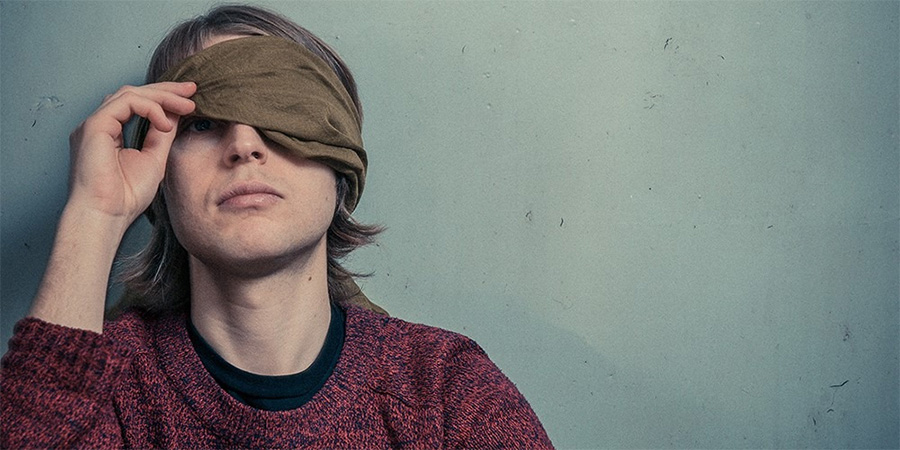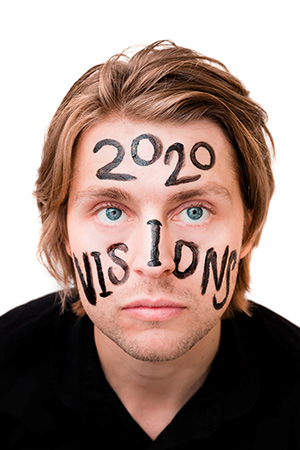Fringe venue accessibility

We've been thinking about venue accessibility recently, so we asked visually impaired comedian Tom Skelton to talk us through his experiences of moving around the Edinburgh Festival Fringe.
My own personal experiences of accessibility at the Fringe have generally been positive, both as a performer and audience member. Of course, my experiences have varied widely depending on the year, the venue, individual staff and my own ability to communicate my accessibility needs.
I have been lucky in that, ever since I lost most of my sight and returned to the Edinburgh Fringe, I had a sherpa in my very good friend and fellow comedian Douglas Walker, who is also visually impaired. He knew all about how best to get a disabled/access ticket with a free carer companion so he could help and advise me on how and who to ask to make sure I was always guaranteed to be sitting on the front row (as well as getting the all-important concession fare!).
As a performer, accessibility certainly depends on the venue. Without necessarily naming rooms or spaces, as you can imagine, some venues are better designed for a VIP (visually impaired person!).

I do think that a lack of awareness from venues and staff about potential problems for a blind/partially sighted person can quite often be blamed on my own occasional lack of communication about the reasonable adjustments or adaptations that my impairment requires.
Some venues are much more prone to leaving obstacles or clutter in walkways and doorways, and having slightly dodgy sharp corners or objects around - but when I have not alerted the venue to my disability and how potential problems or pitfalls (literally sometimes) can be avoided, my instinct is that the blame should partly fall on me.
However, ideally the venues would all be accessible anyway, without any special measures or adaptations being made, as it's often very boring and depressing to think about all of the possible issues and adjustments that you face and need as a VIP. Of course, why we all love the Fringe so much is because of the haphazard, ad hoc nature of many of the venues, and as soon as I express the very keenly felt desire for all venues to be completely accessible, I have to confess that part of me rails against that and wants the potential gloomy lighting and multiple trip hazards of a tiny room at the very back end of the pub.

This is not to conflate accessibility with sanitisation, but I feel like sometimes there is an assumption that an accessible venue has to be an overly sanitised, even vaguely artificial experience, which it absolutely does not have to be.
When I think about this topic too much, I can confuse myself and disagree violently with myself from second to second... but accessible and characterful do not have to be on opposite sides!
This is where the staff often come in, and I have to say that generally the Fringe staff across all venues are really good, and as soon as they know you have an access ticket or you explain what you need from them, they are very helpful. I am often told that I don't look blind or I don't appear visually impaired, but in almost all instances, the staff listen to what I tell them I need and what my ticket says.
There are, of course, some amusing exceptions to this. There was one time that I'll never forget when Dougie - Douglas Walker, who I mentioned before - and I had bought access tickets to go and see a play about Gordon Brown (a fellow VIP of course, funnily enough), which we were very much looking forward to after that morning doing Aaand Now For Something Completely Improvised with our comedy group Racing Minds. When we went up to the front of house staff to tell them that we had disabled tickets, and to request sitting in the front row, the member of staff replied "you know that I saw your show this morning?". The tone did, with hindsight, sound slightly more suspicious than complimentary, but we weren't paying that much attention at the time, so we just said "thank you, that's great". The member of staff then let us sit in the front row, and we enjoyed the Shakespearean tragedy of the final days of Gordon Brown very much.
Later that evening, our producer took a phone call from someone senior at the venue saying that a complaint had come in about our group. The specific complaint was that two members of our comedy group had been going round buying access tickets and pretending to be disabled. Our producer replied, "but they are disabled". Of course, we all found it extremely funny and astonishing, especially Dougie and I, and I suppose this reflects a sort of soft prejudice about disability and accessibility.
Because neither Dougie nor I had any of the usual indicators that we were sight-impaired during our improv show, the member of staff assumed that we were not, and when we presented our concessionary disabled access tickets, the first assumption was not that - despite their assumption and our appearance, we were actually blind - but that we must be masquerading as visually impaired people, in order to get the half-price tickets.
This is a story that Dougie and I often tell, and we love to tell it, and I think it illustrates the hugely important role that individual staff play, and the need for staff, members of the public and venues generally to understand that disabilities can often be invisible and do not always match the stereotype. Of course, this is not to single out that member of staff, as they were obviously trying to do the right thing; though it is interesting how that was their assumption.

I think that, for me, accessibility depends both on venues being designed to be as accessible as possible for everyone (whilst retaining their character of course) so that people with accessibility needs have to think about them as little as possible, and the philosophy of "design for all, better for everyone" as an ideal that I hope venues and society in general are working towards.
Moreover, it's about communication and not making assumptions. It does fall to the individual to communicate their accessibility needs as best they can, but also for the venue and staff to be as open, responsive and understanding about the huge spectrum of different needs to make performances accessible and inclusive.
I remember once when I was doing a solo show that Dougie (I might have to give him some sort of fee for the amount of appearances he has made in this!) had booked two disabled access tickets for the front row, but the venue staff assumed that it was for a wheelchair, so they removed three seats from the room and when Dougie arrived and explained to them that it was because of his visual impairment, the show was delayed by 5-10 minutes as the room was rearranged. But despite times like this and funny (in hindsight) misunderstandings like that, I do think that generally the Fringe is very open and understanding about accessibility and making sure the individual needs are met as best as each room, venue and show possibly can.
Having said all of this, doubtless I will go to a gig tonight and twist my ankle whilst falling down the stairs of some tiny, characterful little pub...!
Help British comedy by becoming a BCG Supporter. Donate and join us in preserving, amplifying and investing in comedy of all forms, from the grass roots up. Advertising doesn't cover our costs, so every single donation matters and is put to good use. Thank you.
Love comedy? Find out more
